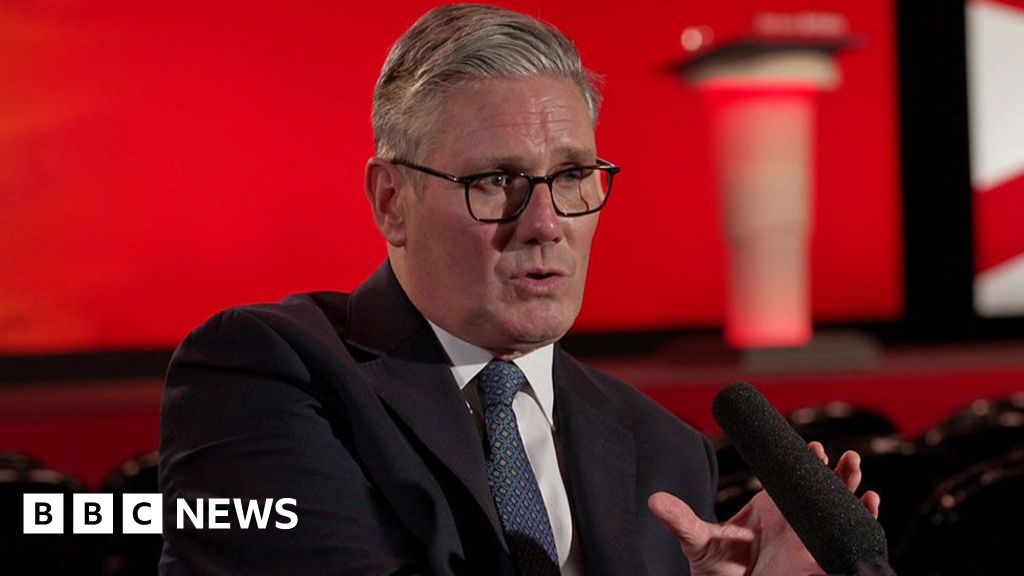PM wants to change how international law used in asylum cases
Sam FrancisPolitical reporter
Sir Keir Starmer wants to change how international law is interpreted, to stop unsuccessful asylum seekers blocking their deportation on the grounds they could be sent to worse prisons or healthcare systems.
The prime minister told the BBC he did not want to “tear down” human rights laws, but is ready to look again at article three of the European Convention on Human Rights, which protects against torture and degrading treatment.
The prime minister said mass migration in recent years meant there needed to be a change, but those genuinely fleeing persecution should still be given asylum.
His comments came after his home secretary set out plans to tighten rules for migrants seeking indefinite leave to remain.
On the issue of deportation, he was asked by Radio 4’s Today programme about the example of a Brazilian paedophile who successfully claimed he would be treated worse in a Brazilian prison than he would in a British prison.
Sir Keir said there was a difference between deporting someone to “summary execution” and sending them to somewhere with a different level of healthcare or prison conditions.
He added “we need to look again at the interpretation” of a wide range of international laws by UK courts.
He warned that laws must be “applied in the circumstances as they are now” before adding that countries were experiencing “mass migration in a way that we have not seen in previous years”.
To meet this new challenge “we need to look at again at the interpretation of some of these provisions, not tear them down”, he said.
He added: “I believe that those genuinely fleeing persecution should be afforded asylum and that is a compassionate act.”
Pressed for details about what was blocking deportations of foreign criminals, Sir Keir cited Articles 3 and 8 of the ECHR – which ban torture and protect the right to private and family life respectively.
“But it’s more than that,” he said, pointing to the UN’s Refugee Convention, Torture Convention and Convention on the Rights of the Child as potential barriers.
Ministers were already exploring ways to tighten the interpretation of some aspects of the ECHR to crack down on immigration.
In May, the government’s immigration white paper promised legislation to “clarify” how the right to a family life in European human rights law should apply to immigration cases.
Before being made foreign secretary, Yvette Cooper ordered home officials to look into how courts used laws that halted deportations on torture grounds.
Sir Keir’s comments come after a Labour conference dominated by efforts to confront Reform UK.
The prime minister used his keynote speech to cast Nigel Farage’s movement as practising the “politics of grievance” and to position Labour as the party of “tolerant, decent” patriotism.
He stopped short in the speech of repeating his attack on Reform’s deportation proposals as “racist” but vowed to fight racist rhetoric “with everything we have”.
Sir Keir has also spent the conference contending with a provocative challenge to his leadership by Greater Manchester Mayor Andy Burnham who said Labour MPs had asked him all summer to return to Westminster and take over as prime minister.
Asked about internal challenges to his leadership, Sir Keir said he had “been underestimated every time” he had taken on a senior role.
Despite this, “I pushed through the barriers,” he said.
Sir Keir told the BBC: “I didn’t come into politics as some sort of popularity contest.
“I came in with one focus, which is changing my country for the better.
“I’m proud to be prime minister, getting on with that work.”
During a wide-ranging interview, Sir Keir also said it was “wrong” that thousands of young people remained out of work because of mental problems.
“I’m not saying you don’t and shouldn’t have benefits for mental health issues but I do think we need to examine this quite carefully,” he added.
“I say it because if you are on benefits, in your 20s, it is going to be extremely difficult to get off benefits for the rest of your life.”
Speaking to BBC Breakfast, he added he was committed getting “bills down for those at home and for businesses,” as energy costs increase by 2% from Wednesday for millions of people in England, Wales and Scotland, as regulator Ofgem’s latest price cap come into effect.
Asked about the soaring price of food, Sir Keir said the recently published UK-EU SPS Agreement – which stands for sanitary and phytosanitary and refers to rules about animals and food – would mean food prices would soon drop.
He added Labour was “laser focused” on reducing costs, growing the economy and doubling down on fiscal rules.
But Richard Fuller, shadow chief secretary to the Treasury said Labour was “getting ready to whack people with higher taxes” at the Budget, which will be unveiled in November.

Share this content:





إرسال التعليق